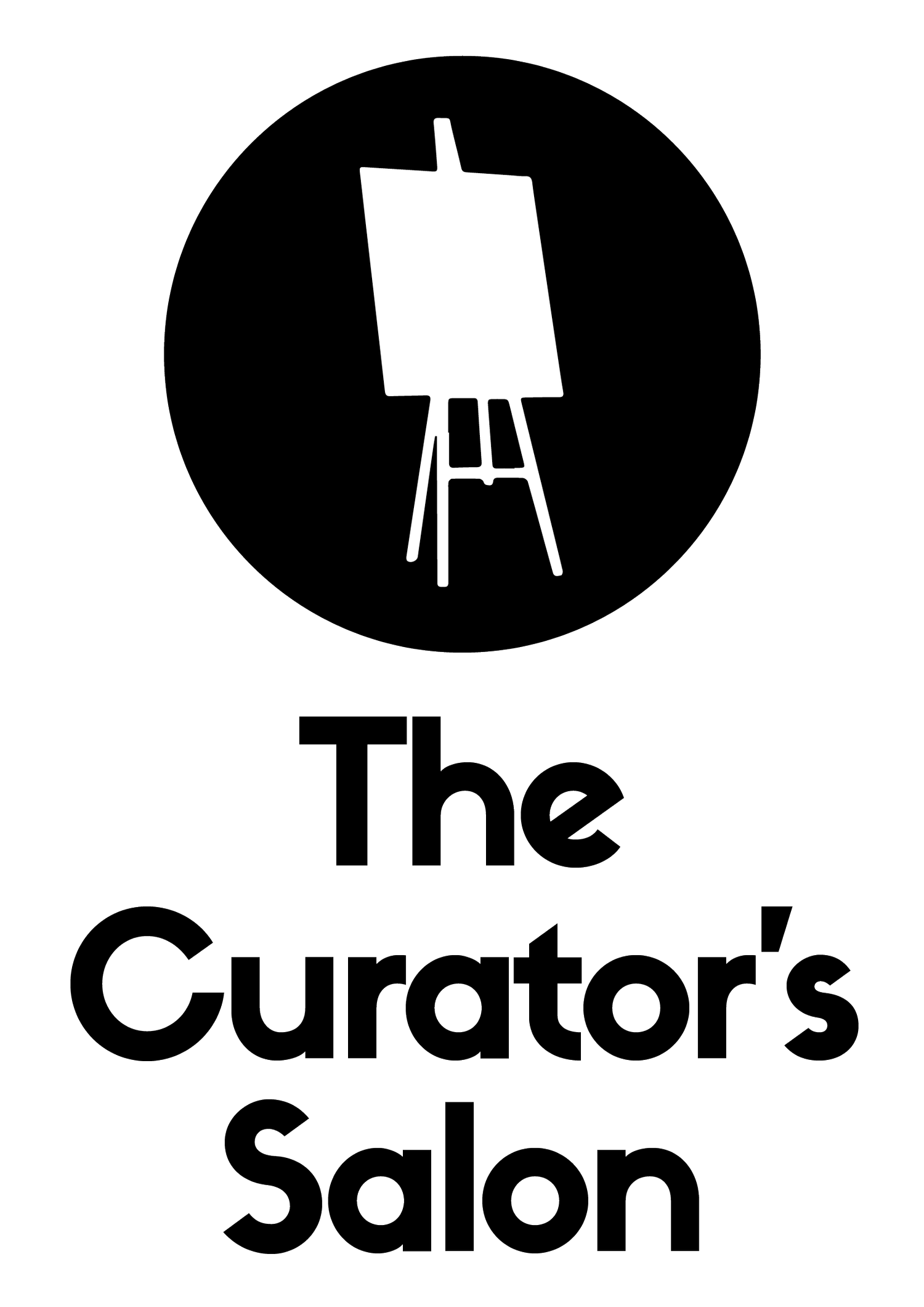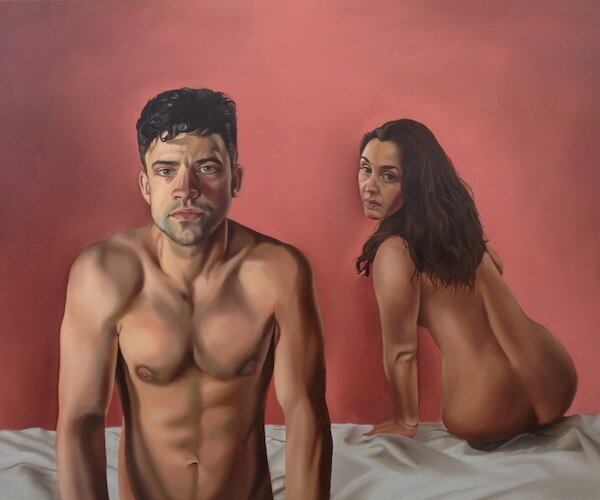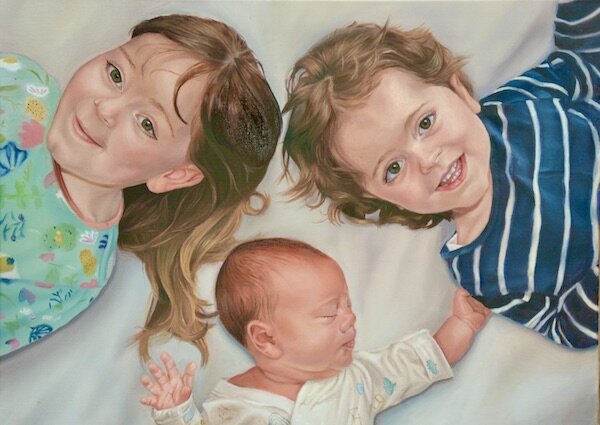China Jordan
I caught up with London-based realist painter China Jordan and learned about her search for what ‘realism’ really means as well as her dream projects.
Waiting by China Jordan
Tell me about your background.
As cliche as it is, I guess I have always been an artist. I remember in nursery discovering that the shape of an eye was actually an almond rather than a circle and I was amazed that the other kids weren’t doing this, and also annoyed that the teachers were telling us to draw circles! I was always the kid sketching at home rather than playing games, and when it came to choosing my options for GCSE, I was always drawn (excuse the pun) to the creative subjects. It was a tough call to choose academia or crevatis, but I realised I was dyslexic and so it was a no brainer to head down the path of creativity and follow my dreams as an artist. Since being rejected from 4 universities and having only Wimbledon College of Art accept me, I wasn’t sure if I had made the right decision. I had a very old school talent and the rejection sent me the message that maybe this skill had long passed it. After uni, and barely getting a 2.2, I learnt about the industry, the struggles as an artist and low percentage chances of regular, good income, especially with the discipline I loved the most - realism. I have been exploring, learning, and working in the art industry for a decade now, most of which was spent in galleries as a technician through to an exhibitions manager and it wasn’t until 2 years ago when I left all that behind and started on my own. I am based in London and I am now a full time artist and business owner helping to bring art into people’s lives to make it more inclusive and engaging again.
What ideas are you exploring in your work?
My subject matters vary and they are beginning to take a path of their own that I never expected. My focus was realism, and always has been. When tutors were telling me realism was dated and dead, I was heartbroken. How can this skill not be appreciated and loved? I think stubbornness took me on the path of photorealism and when I painted my first artwork in that style, I felt I had climbed everest. I did it. I made reality. Now - I am beginning to question what is reality and did I capture it at all? Is it copying a photograph or is it having the ability to see beyond that and capture the moment purely and honestly without being restricted by accuracy and photography. I am torn between the technical realistic representation of something and the emotional connection you have with your own reality. Now, I am searching for what ‘realism’ means and are there other ways to capture it rather than just from a photograph that is already 2 steps away from its purest form.
Can you share about your artistic process?
My process is quite simple, especially if I am working with a client for a commission. I like to get an understanding of what they would like, and I also want to understand what they are visualing. I am trying to capture their reality and so we work with a mixture of photographs, several conversations and then 1 preliminary sketch to make sure we get it right.
If I am painting for myself, I mainly find something I love and just go for it. If you have a passion for something you can usually hear it in that person's tone of voice and for me, you can see it in my artwork. I usually look for something with a lot of colour and interesting lighting and I will take a whole load of pictures of it. Then, I tend to sit for a while looking at them, going back and forth to decide which picture would firstly look best as a painting, but secondly, reminds me of that moment and why I took the picture in the first place. Once I start painting, I usually go through some turmoil of hating it for around 2-3 weeks and in the final stage, I will start to feel nervous as my brain comes around to falling in love with it.
Overground by China Jordan
Can you talk a bit about the evolution of your practice and your work?
Being a realist painter has always been very important to me. It has been a goal of mine since a little girl when I realised my first almond shape for an eye. I felt like if I could conquer realism I could really do anything. By copying nature in paint, I am somehow a part of it more. I was self taught for the majority of my life, maybe attending some life drawing classes at college, or speaking to other young artists but there weren’t many of us and there wasn’t much around in Grimsby, especially when the internet was relatively new in the area. I was always the best in class, and until I got to uni, I realised that my skill was quite rare but also, that I wasn’t getting the education I was looking for. Some students may have been people who could paint realistically, but they were always encouraged to add to abstract twists and deconstruct it and most artists did. I couldn’t. It wasn’t in me then.
University was a frustrating dead end for me and it wasn’t until a friend of mine, who now runs an atelier school in Edinburgh, introduced me to this archaic way of drawing and painting that my work improved overnight. I learnt about bargue drawing in a 5 day course, and my painting had become 1000 x more realistic and all of the pennies dropped! I was painting quicker, I was more bold with my colours and I was finally starting to think about narrative and what it meant to be a realistic artist. I started to question realism for the first time, because I was able to understand it and it was a whole revelation for me. Like any musician, or chef, or dancer - once you have the tools, you can do whatever you want and you can do it efficiently. Sadly, after the poor relationship I had with my university, I stepped away from painting for a couple of years to pursue life in the office at a Gallery and only began painting again when I was commissioned by Dominos to paint for their Master Pizza range with the Mona Lisa eating pizza. This ignited my love of painting once again and I realised what I had been missing out on. Since then, perhaps the past 5 years or so, I have been painting commissions for brands, exploring my own practise and continuing to develop my own understanding of the term ‘realistic artist’ and sharing my knowledge with others.
Artwork by China Jordan
Can you share one of your favourite quotes?
‘Each artist was once an amateur.’ by Ralph Waldo Emerson.
I think it is incredibly important that everyone in the world knows and understands that they are entitled to love and to be a part of Art. Too many times I hear that people are afraid of drawing, or don’t go to galleries because they never went to art school. As an artist myself, it makes me remember when I was a youngster in Grimsby, with no real concept of this ‘elitist’ idea the industry had and I was an amature. I think having this naivety helped me to pursue the career I loved and I am thankful for that. I wish everyone knew that being an amature is a blessing and not a curse and if they only just start, they will learn that they are entitled to art just as much as the professionals.
Which artists do you enjoy at the moment?
My inspirations are Mitch Griffiths, Max West and Elena Gual.
I have worked with all three of these artists on the logistics side and I have had the privilege to see the works close up and handle them. These artists are all very humbled and passionate, not eccentric in any cliche way, but they truly love what they do and they are so talented.
Mitch has been a long term hero of mine and tells stories through his hyper realistic work. His work leaves me speechless and moved every single time.
Max is amazing and I am not sure he quite realises it. His portraits and landscapes are so colourful and gestural but you are still able to recognise what it is he is trying to achieve. I recently purchased some of his work because they are stunning and I am so glad I did. I can just look at them for hours and get lost in the movement that he manages to capture.
Elena was a new discovery for me and she truly is a master of colour and line. Her portraits are simple yet complex and full of colour, diversity and empowering women. She is certainly one to watch for the future.
Artwork by China Jordan
What is the most memorable thing someone has said about your work?
‘Is that a photograph or a painting’?
It is hard to remember what others say about your work, but I do feel proud when they ask if it is a photograph. I guess because that was my aim for so long, it helps to show me that I reached my goal.
What would be a dream project for you?
My dream project would be exploring realism and capturing that from nature. I want to travel across the country, maybe even abroad once this pandemic is over and paint from nature and explore painting en plein air to see where that journey takes me. My next challenge is to loosen my realistic style and learn what realism truly means when you are limited by time, weather and lighting. Can I capture a scene as it disappears in front of my eyes?
Give China a follow on Instagram @chinajordanart.




